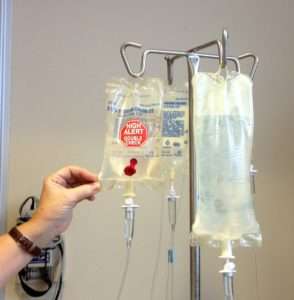Nausea is when you feel sick to your stomach as if you are going to throw up. Vomiting is when you throw up. Jay Harold wrote this post, “8 Symptoms of Nausea & Vomiting: 6 Reasons to Seek Help,” that gives you some good information to deal with this healthcare ordeal.
What causes nausea and vomiting1?
Nausea and vomiting can be symptoms of many different conditions, including
- Morning sickness during pregnancy
- Gastroenteritis (infection of your intestines) and other infections
- Migraines
- Motion sickness
- Food poisoning
- Medicines, including those for cancer chemotherapy
- GERD (reflux) and ulcers
- Intestinal obstruction
When should I see a health care provider for nausea and vomiting?
Nausea and vomiting are common. They are usually not serious. However, you should contact your health care provider immediately if you have
- A reason to think that your vomiting is from poisoning
- Vomited for longer than 24 hours
- Blood in the vomit
- Severe abdominal pain
- A severe headache and stiff neck
- Signs of dehydration, such as dry mouth, infrequent urination or dark urine
How is the cause of nausea and vomiting diagnosed?
Your health care provider will take your medical history, ask about your symptoms and do a physical exam. The provider will look for signs of dehydration. You may have some tests, including blood and urine tests. Women may also have a pregnancy test.
What are the treatments for nausea and vomiting?
Treatments for nausea and vomiting depend on the cause. You may get treatment for the underlying problem. There are some medicines that can cause treatment nausea and vomiting. For severe cases of vomiting, you may need extra fluids through an IV (intravenous).
There are things that you can do to feel better:
- Get enough fluids, to avoid dehydration. If you are having trouble keeping liquids down, drink small amounts of clear liquids often.
- Eat bland foods; stay away from spicy, fatty, or salty foods
- Eat smaller meals more often
- Avoid strong smells, since they can sometimes trigger nausea and vomiting
- If you are pregnant and have morning sickness, eat crackers before you get out of bed in the morning
What Types Of Medications are available to treat nausea and vomiting2?
Drugs used to treat nausea and vomiting are called antiemetics. Many types of antiemetics can decrease the severity of nausea, although most require a medical evaluation and prescription. Medicines available over-the-counter are mainly recommended for use in motion sickness and for cases of mild nausea.
- Meclizine hydrochloride (Bonine) is an antihistamine that is effective in the treatment of nausea, vomiting, and dizziness associated with motion sickness. Unless recommended by a physician, it should not be taken by people with lung diseases, glaucoma, or those who have difficulty urinating due to an enlarged prostate. Meclizine may cause drowsiness and should not be taken with other sedatives such as alcohol, tranquilizers, or sleeping pills. Due to drowsiness, people using meclizine should not drive or operate dangerous machinery. Meclizine is not recommended in children under 12 or in pregnant or nursing women unless recommended by a doctor.
- Dimenhydrinate (Dramamine) also is an antihistamine. Its use should be limited to motion sickness. It can cause drowsiness and should be avoided in the same situations as Meclizine. Several different formulations of dimenhydrinate are available, including a children’s liquid, which should be used according to the directions under the direction of a physician. Dramamine Less Drowsy Formula contains meclizine, like Bonine, and may have fewer sedative side effects. Both meclizine and dimenhydrinate are recommended to be taken about an hour before travel to prevent motion sickness.
- Emetrol is an oral solution designed to soothe the stomach when nausea and vomiting are caused by a viral or bacterial infection or overeating. Emetrol contains sugar and phosphoric acid. Diabetics should not use Emetrol without medical supervision because of the concentrated sugar. According to its manufacturer, Emetrol should not be taken for more than five doses in one hour without consulting a physician. Consult a doctor before using this medicine for pregnant or nursing women and young children.
- Bismuth subsalicylate (Pepto-Bismol, Kaopectate) is a product containing bismuth subsalicylate, a chemical shown to be effective in relieving nausea and upset stomach. This remedy has a direct effect on the stomach lining and has no known serious side effects. It may cause darkening of the stool color and of the tongue. Pregnant or nursing women should consult their doctors before using bismuth subsalicylate since part of the active ingredient (salicylate) is chemically similar to aspirin, which may harm infants and the fetus. Patients allergic to aspirin or related drugs also should not use bismuth subsalicylate. Use under the direction of a physician if you take anticoagulants (blood thinners) or have diabetes or gout because the salicylate may further promote the anticoagulant effect.
Drugs That May Be Prescribed by Your Doctor for Chemotherapy-Related Nausea3
When suffering from nausea caused by chemotherapy treatments, your doctor will prescribe anti-nausea medications to prevent or relieve nausea.
Likewise, your doctor may not prescribe any anti-nausea drugs because not all chemotherapy cause nausea and vomiting. However, if the chemotherapy is likely to cause nausea and vomiting, your doctor may prescribe one or more of the following common anti-nausea medications:
- Aprepitant (Emend®)
- Dolasetron (Anzemet®)
- Granisetron (Kytril®)
- Ondansetron (Zofran®)
- Palonosetron (Aloxi®)
- Proclorperazine (Compazine®)
- Promethazine (Anergan®), (Phenergan®)

- Netupitant-Palonosetron (Akyzeo®)
- Rolapitant (Varubi®)
- Lorazepam (Ativan®)
- Metoclopramide (Reglan®)
- Dexamethasone (Decadron®)
- Famotidine (Pepcid®)
- Ranitidine (Zantac®)
These can be prescribed for you to take before, during, and/or after chemotherapy. As you can see, there are many different medications that your doctor can prescribe to control these symptoms. It may take trying a couple of different medications before finding the right match for you.
A path to improved health4
How do antiemetic medicines work?
Bismuth subsalicylate works by protecting the stomach lining.
Antihistamines appear to dull the inner ear’s ability to sense motion. They block messages to the part of the brain that controls nausea and vomiting. This is why they work best if you take them before you start feeling motion sickness.
How do I safely take OTC antiemetic medicines?
Before you take an OTC antiemetic medicine, read the directions on the drug facts label. This will tell you how much medicine to take and how often to take it. If you have any questions, call your family doctor or pharmacist. Keep a record of which OTC medicines you are using and when you take them. If you need to go to the doctor, take this list with you.
Follow these tips to make sure you are taking the right amount of medicine:
- Take only the amount recommended on the medicine’s label. Don’t assume that more medicine will work better or quicker. Taking more than the recommended amount can be dangerous.
- If you are taking prescription medicine, ask your doctor if it’s okay to also take an OTC antiemetic medicine.
- Don’t use more than one kind of OTC antiemetic medicine at a time unless your doctor says it’s okay. They may have similar active ingredients. These could add up to be too much medicine.
How can I safely store OTC antiemetic medicines?
Store all medicines up and away, out of reach and sight of young children. Keep medicines in a cool, dry place. This will help prevent them from becoming less effective. Do not store medicines in bathrooms or bathroom cabinets. They are often hot and humid.
Things to consider
Healthy adults usually don’t experience side effects from antiemetic medicines. Side effects can be a concern for older adults or people who have health problems.

The most common side effects of bismuth subsalicylate are:
- Darkened stools or tongue
- Constipation
- Ringing sound in the ears (tinnitus)
These are short-term side effects.
Antihistamines may make you feel sleepy. This can affect your ability to drive or operate machines. It may be hard for you to think clearly. Alcohol can increase the drowsiness caused by antihistamines. Antihistamines may also cause your mouth and eyes to feel dry.
Who shouldn’t take OTC antiemetic medicines?
Some people are allergic to aspirin or other salicylate medicines. They should not take bismuth subsalicylate. Don’t give bismuth subsalicylate to children 12 years of age or younger. Don’t give it to children or teenagers who may have the flu or chickenpox. This increases their risk for Reye syndrome. This is a serious illness that can lead to death.
Before taking an antihistamine, talk to your doctor if you have any of the following problems:
- Glaucoma
- Trouble urinating (from an enlarged prostate gland)
- Breathing problems, such as asthma, emphysema, or chronic bronchitis
- Thyroid disease
- Heart disease
- High blood pressure
Can OTC antiemetic medicines cause problems with any other medicines I take?
Bismuth subsalicylate may affect how well some medicines work. It also may cause side effects if combined with other medicines. Ask your doctor before taking bismuth subsalicylate if you also take:
- Blood-thinning medicines
- Medicines for Gout
- Medicines for arthritis
- Medicines for diabetes

Ask your doctor before taking bismuth subsalicylate if you take pain relievers or cold medicines. These medicines may contain aspirin, which is a salicylate. You may get too much salicylate if you take more than 1 of these medicines at a time.
Talk to your doctor before taking an antihistamine if you take sleeping pills, sedatives, or muscle relaxants. Many OTC cold and allergy medicines contain antihistamines. If you use more than 1 of these medicines, you may get more antihistamine than you intend. Some prescription medicines have side effects similar to the side effects of antihistamines. These could include dry mouth and drowsiness.
Talk with your doctor before taking these medicines at the same time.
Questions to ask your doctor
- What kind of antiemetic medicine is best for me?
- How does the medicine help my nausea?
- How often can I take it?
- Is there a limit on how many days I can take it?
- What kinds of side effects should I look for?
Jay Harold hopes you enjoyed this post, “8 Symptoms of Nausea & Vomiting: 6 Reasons to Seek Help” Remember that the treatment and prevention of nausea and vomiting improve the quality of life of patients. Please Share it and read more about Jay Harold here. Please take this advice from Muhammad Ali and give back to others. “Service to others is the rent you pay for your room here on earth.”




